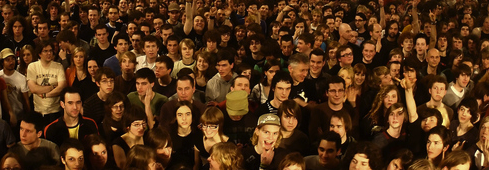 Researchers from multiple disciplines spanning computer science, mathematics, the social, behavioral, and economic sciences, and biology gathered at the Massachusetts Institute of Technology last week for the first-ever Collective Intelligence conference. Organized by Tom Malone (MIT) and Luis von Ahn (Carnegie Mellon University), the conference sought papers about behavior that is both collective (spanning groups of individual actors, including people, computational agents, and organizations) and intelligent (the collective behavior of the group exhibits characteristics such as perception, learning, judgment, or problem solving).
Researchers from multiple disciplines spanning computer science, mathematics, the social, behavioral, and economic sciences, and biology gathered at the Massachusetts Institute of Technology last week for the first-ever Collective Intelligence conference. Organized by Tom Malone (MIT) and Luis von Ahn (Carnegie Mellon University), the conference sought papers about behavior that is both collective (spanning groups of individual actors, including people, computational agents, and organizations) and intelligent (the collective behavior of the group exhibits characteristics such as perception, learning, judgment, or problem solving).
Over 100 papers were submitted for consideration, and 18 were selected for presentation (following the link):
Visualizing Collective Discursive User Interactions in Online Life Science Communities (Dhiraj Murthy, Alexander Gross, Stephanie Bond)
Analytic Methods for Optimizing Realtime Crowdsourcing (Michael S. Bernstein, David R. Karger, Robert C. Miller, Joel Brandt)
Crowd & Prejudice: An Impossibility Theorem for Crowd Labelling without a Gold Standard (Nicolás Della Penna, Mark Reid)
Re-Differentiation as Collective Intelligence: The Ktunaxa Language Online Community (Christopher Horsethief)
Group Foraging in Dynamic Environments (Michael Roberts, Sam Cheesman, Patrick McMullen)
Markerless Motion Capture in the Crowd (Ian Spiro, Thomas Huston, Chris Bregler)
Tracking the 2011 Student-Led Movement in Chile through Social Media Use (Cristobal Garcia)
Thermodynamic Principles in Social Collaborations (Zhang Ying, Huan-Kai Peng, Peter Pirolli, Tad Hogg)
When Majority Voting Fails: Comparing Quality Assurance Methods for Noisy Human Computation Environment (Yu-An Sun, Christopher Dance)
An Existing, Ecologically-Successful Genus of Collectively Intelligent Artificial Creatures (Benjamin Kuipers)
Effects of Social Influence on the Wisdom of Crowds (Claudio Tessone, Pavlin Mavrodiev, Frank Schweitzer)
Learning to Predict the Wisdom of Crowds (Seyda Ertekin, Haym Hirsh, Cynthia Rudin)
What “Crowdsourcing” Obscures: Exposing the Dynamics of Connected Crowd Work during Disaster (Kate Starbird)
Collaborative Development in Wikipedia (Gerald Kane, Sam Ransbotham)
Crowdsourcing Collective Emotional Intelligence (Rob Morris, Rosalind Picard)
Toward a Comparative Cognitive History: Archimedes and D. H. J. Polymath(Lav Varshney)
Collective Intelligence in Humans: A Literature Review (Juho Salminen)
Crowdsourcing Gaze Data Collection (Dmitry Rudoy, Dan Goldman, Eli Shechtman, Lihi Zelnik-Manor)
See them all here.
According Malone, as quoted in a a MIT press story about the conference:
“Collective intelligence (CI) is an emerging interdisciplinary field that overlaps with many other disciplines, including computer science, management, network science, economics, social psychology, sociology, political science, and biology (e.g., social insects)…
“[The conference included] researchers who are trying to solve deep scientific questions such as: What are the conditions that lead groups to become more collectively intelligent instead of, say, collectively stupid? The answers to these are theoretical questions [that] can have huge, practical implications. They can, for instance, help companies become more productive and help societies solve their problems more effectively.”
Plans are already underway for a second Collective Intelligence conference, to be held in early 2013.
To learn more, check out the conference website.
(Contributed by Erwin Gianchandani, CCC Director)









